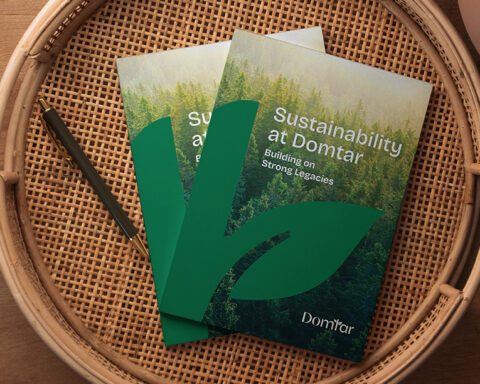This article is “sponsored content” as defined by Corporate Knights’ content disclosure policy.
Canada’s first Emissions Reductions Plan calls for net-zero electricity by 2035, but industry experts warn that the current federal budget won’t get us there. Fortunately, the stage is set for the business community to accelerate the renewable energy transition and secure favourable electricity rates in the process.
Alberta has Canada’s most carbon-intensive grid, as well as the nation’s only deregulated electricity market. These two factors, along with abundant wind and solar resources, have made the province a prime destination for renewable electricity developers and corporate buyers.
Bullfrog Power, Canada’s leading green energy provider, recently formed a buyers’ group with RBC and Shopify to purchase energy from the Rattlesnake Ridge Wind Power Project in Alberta. The three companies signed power purchase agreements (PPAs) with Berkshire Hathaway Energy Canada to offtake a combined 90,000 MWh of renewable electricity per year. The wind project was completed in June, and is now powering the equivalent of 78,000 homes.
When signing a PPA, buyers provide long-term price certainty to developers for a renewable energy project that hasn’t been built yet. This helps developers secure financing for the new wind or solar farm. Once the project is complete, the buyer procures renewable electricity and has insulation against rising or volatile energy prices.
“PPAs are an important tool for companies looking to meet their renewable energy commitments and have a positive impact on Canada’s grid, all while minding the bottom line,” said Suha Jethalal, President of Bullfrog Power.
Canadian power purchase agreements are only possible in Alberta’s deregulated market, but out-of-province companies can still take advantage of these deals through a virtual PPA, which is a financial contract for renewable energy certificates. This approach is attractive to buyers that want to maximize the emissions reductions from their green electricity procurement and, depending on electricity rates, possibly make a profit on the deal.
The favourable economics of a PPA and mounting public pressure for companies to reduce emissions are positioning businesses as a driving factor in Alberta’s green energy transition.
Corporate power purchase agreements are already facilitating significant renewable growth, and they’re gaining popularity exponentially. In 2021 alone, Canadian organizations contracted 1,262 MW of wind and solar deals according to Business Renewables Centre-Canada. For context, Alberta’s largest natural gas-fueled power plant, the Shepard Energy Centre, has a capacity of 800 MW.
“[PPAs] help bring more renewables online and have contributed to reducing emissions from Canada’s grid much faster than could otherwise have been accomplished,” says Nagwan Al-Guneid, Director of Business Renewables Centre-Canada. “Not only that, but they are an economic win too: private renewables investment will support $3.75 billion in construction by 2023 and nearly 4,500 jobs that come with it.”
PPAs bring environmental, financial, and brand benefits to the table, but there are some drawbacks. These are complex, long-term deals that are best suited for large power users with some energy expertise. Your local small business won’t be signing a PPA any time soon, and even large organizations may need some help.
Through our PPA solutions, Bullfrog Power helps companies like Shopify navigate the entire process, from identifying a project to reaching a signed PPA. We advise our clients on choosing a renewable project that fits their needs, mitigating financial risk, and assembling buyers’ groups.
“Bullfrog Power provided excellent support to Shopify as we identified and selected a high impact renewable energy project for our first PPA,” said Stacy Kauk, Head of Sustainability at Shopify.
Bullfrog also recently advised MEGlobal Canada ULC on signing a power purchase agreement to offtake 126 MW from Capital Power’s Whitla Wind farm. This agreement is one of the largest Canadian PPAs to date.
When embarking on a complicated deal like a PPA, companies have a lot to gain by working together. Forming a buyers’ group like the one Shopify, RBC, and Bullfrog Power used to procure renewable energy from the Rattlesnake Ridge wind facility is an advantageous strategy – particularly for Canadian companies that have a smaller energy load than the tech giants that dominate the U.S. PPA market.
Buyers’ groups allow companies to stack demand for larger energy projects, take advantage of economies of scale, and share knowledge.
“The power of the buyers’ partnership formed between RBC, Shopify and Bullfrog Power improved our access to large-scale energy projects. Each of our respective organizations increased the impact of our contributions to new renewable energy sources,” said Alex Boulos, VP Climate at RBC. “And RBC’s knowledge of the Alberta utility market and experience in power purchase agreements were key to making the deal successful.”
With this PPA, Bullfrog Power, Shopify, and RBC hope to set an example for other Canadian companies. “No one can solve the climate crisis on their own,” said Mrs. Jethalal. “We need to collaborate and pool our strengths if we’re going to transform our energy systems for the better. Bringing a new wind or solar farm online with a PPA is a perfect example of what we can accomplish together.”
Click here to learn more about Bullfrog Power’s PPA solutions.







